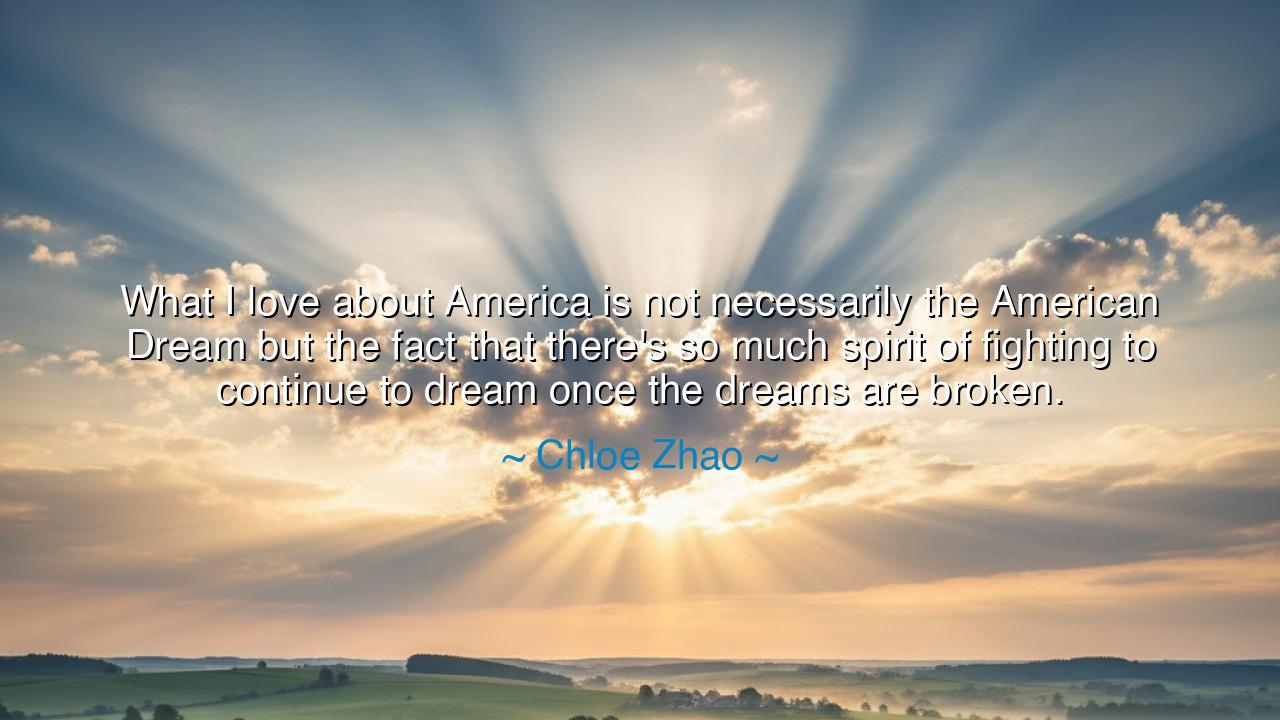
What I love about America is not necessarily the American Dream
What I love about America is not necessarily the American Dream but the fact that there's so much spirit of fighting to continue to dream once the dreams are broken.






Here is a lyrical, ancient-style reflection on Chloé Zhao’s quote:
The Fire After the Fall
When Chloé Zhao said, “What I love about America is not necessarily the American Dream but the fact that there’s so much spirit of fighting to continue to dream once the dreams are broken,” she spoke not only of a nation, but of the human soul itself. For what she praises is not the dream fulfilled, but the heart that endures after the dream has shattered. Her words echo through time like the song of the ancients — a hymn to resilience, to the quiet courage of those who refuse to let despair be the final word.
The American Dream has long been sung as a promise — of prosperity, success, and self-made destiny. But Zhao peers beyond the glitter of that promise. She honors instead the struggle that follows disappointment, the strength that arises from ruin. In this, her wisdom transcends borders and ages, for every people, every age, has known the breaking of dreams. Yet few have celebrated what comes after — the rebuilding, the reaching once more for the light.
Consider the tale of Abraham Lincoln, who before he became a symbol of unity and freedom, was a man acquainted with failure. He lost elections, faced heartbreak, and was shadowed by melancholy. Yet he kept rising, not because success was certain, but because he believed in the worth of continuing the dream. It was that same enduring spirit — the refusal to surrender to despair — that forged his greatness. Zhao’s words honor this same truth: that the truest victory is not found in achievement, but in perseverance.
In every fallen dream lies a seed. When the dream breaks, the shallow dream dies, but the deeper one — the dream of becoming, of growing, of learning what truly matters — begins to take root. Those who rise after loss discover a different kind of freedom, one that no material success can offer. This is the spirit Zhao calls sacred: the will to dream again, to continue the quest even when the first vision lies in ruins.
Look, too, to the story of the Dust Bowl migrants, the farmers who fled the barren lands of the Great Plains in the 1930s. Their homes turned to dust, their livelihoods gone — yet they carried with them songs, hope, and the stubborn belief that life could begin anew in California’s golden fields. Many found hardship again, but their endurance carved the heart of America itself. They were the living proof that dreams, once broken, do not die — they transform.
This spirit is not limited to one land. It is the same fire that burns in the craftsman who rebuilds after ruin, the artist who paints again after rejection, the mother who teaches her child hope in times of famine. Zhao’s insight is universal: true beauty lies not in perfection, but in the human will to rise, to reimagine, to reclaim light from the ashes of defeat.
Therefore, O listener, learn this: Do not curse the breaking of your dreams. For their shattering may reveal what was false in them, and in that revelation, you may find truth. When the dream fails, do not end your song — change its key. Let your sorrow refine your strength. Keep dreaming, not because you are promised triumph, but because to dream is to affirm life itself.
And when you stand amid the ruins of your hopes, remember this ancient wisdom: The gods favor not the unbroken, but the unbowed. The true glory of humankind lies not in the first dream, but in the courage to dream again.






AAdministratorAdministrator
Welcome, honored guests. Please leave a comment, we will respond soon